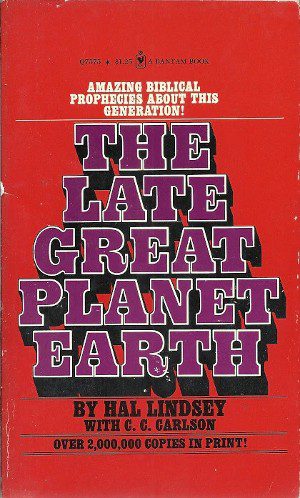Hal Lindsey died in the year 2024 at the age of 95.
According to everything Hal Lindsey spent his long life arguing, none of that should be true. According to Hal Lindsey, he should never have lived to be 95. According to Hal Lindsey, the year 2024 should never have arrived. And according to Hal Lindsey, he should never have died.
 But despite his emphatic refusal to accept their reality, both death and the future arrived for Hal Lindsey.
But despite his emphatic refusal to accept their reality, both death and the future arrived for Hal Lindsey.
The words above are very similar to what I wrote here after Tim LaHaye died at the age of 90 in 2016. And to what I wrote here when Charles Ryrie died that same year at the age of 90. And to what I wrote in 2020 when Jack Van Impe died at the age of 88. And to what I wrote when Harold Camping died in 2013 at the age of 92. It was true as well when Billy Graham died in 2018 at the age of 99. Or when John Walvoord died in 2002 at the age of 92.
The long lives of all of those Rapture-marketing “Bible-prophecy scholars” make me wonder, sometimes, if God was mocking them with longevity. “Gray hair is a crown of glory,” the book of Proverbs says, “it is gained in a righteous life.” But that’s not true if you’ve spent that long life predicting an imminent Rapture, assuring everyone who will listen that the world is not long for this world, that — at any moment, perhaps today or tomorrow, perhaps next week or next year, but very, very soon — the End is Nigh. For such Rapture prophesiers, every year that passes, every birthday, every decade, is just additional proof that everything you’ve been preaching and “prophesying” was wrong.
Psalm 90 says “The days of our years are threescore years and ten” or “threescore and twenty by reason of strength.” Lindsey and LaHaye and the rest make me want to add “or fourscore and ten as illustration of irony.”
In 1970, Hal Lindsey’s The Late Great Planet Earth became a runaway best-seller. That popularized presentation of premillennial dispensationalist folklore assured readers that true believers would never die but, instead, would be “raptured” — whisked off to heaven in the twinkling of an eye while those left behind would suffer years of violent wrath. The book sold millions of copies throughout the 1970s and ’80s.
During those same decades, of course, millions of the books readers and devotees and true believers died, unraptured. Because, after all, the end is always nigh, for everyone, even for those so terrified of the prospect of death that they cling to Rapture fantasies that allow them to pretend “the end is nigh” means something else for special, select, exceptional people like them.
With every passing year after its publication, the argument of Late, Great Planet Earth seemed less plausible and less impressive. Why are we still here, reading this? It says we’re not supposed to still be here.
This problem only became more acute with the publication of Lindsey’s follow-up best-sellers, books like The 1980’s: Countdown to Armageddon. Sales of that one dropped off once the calendar flipped to the 1990s, for obvious reasons.

Lindsey’s popularity stemmed partly from a few flourishes he added to the typical Rapture-prophecy stew, ideas that initially gave his books a sense of greater urgency. His biggest contribution to the construct of Rapture lore was the notion that the founding of the modern nation-state of Israel in 1948 was prophetically significant* and that The End — the Rapture and the Great Tribulation and Armageddon and the end of life, the universe, and everything — was certain to come within “one generation” of that date. And a ” biblical generation,” Lindsey insisted, was about 40 years “or so.”
That “about” and “or so” gave Lindsey’s prophecies a little bit of wiggle room, but not enough. By the time the ’90s arrived his books and prophecies were embarrassingly exposed — and seemed even more embarrassing with every passing year.
This didn’t mean the end of Lindsey’s career/”ministry” as a “Bible-prophecy scholar,” of course — being spectacularly and demonstrably wrong has never been disqualifying in that profession. He cranked out an OKnevermindbutmaybe variation on his earlier prognostications in 1994 titled Earth 2000 AD: Will Mankind Survive? and had another bestseller. That led to a TV “news” show on Christian cable where he could continue being wrong for many more years.
The man kept busy — lucratively busy — right up until this year, constantly working and re-working his shtick insisting that the most recent headlines, whatever they were, somehow confirmed his esoteric, tortured, but supposedly “literal interpretation” of biblical prophecy.
Like most such “Bible-prophecy scholars” — and unlike many of their followers — Lindsey managed his money well. Most of these unexpectedly, contradictorily long-lived Rapture preachers invested wisely and practiced the kind of long-term responsible financial planning that all of their teaching insisted was unnecessary if anything they were saying was true. (The exception to this was Harold Camping, who sold off many of his assets in anticipation of the Rapture while convincing many of his less-secure followers to do the same.)
I’ve never seen a detailed investigative deep-dive into this, but it would be illuminating, I think, for some enterprising financial journalist to look at the fortunes amassed by folks like Lindsey, LaHaye, Graham, and Van Impe, and the careful long-term investments they made throughout their long lives to ensure they left behind comfortable estates for their heirs — their children and grandchildren and great-grandchildren. That could be supplemented, perhaps, by someone with the psychiatric insight who could explore how all of these men thought about the grandchildren and great-grandchildren that they spent so many years preaching would never come to be born or to live for anywhere near as long as they all did.
I don’t think this long-term financial planning constitutes proof of duplicity or dishonesty, but it certainly proves that the certainty they preached was less certain when it came to their own lives and futures than it seemed to be for the lives and futures of others. With a well-hidden humility, they hedged their bets in case they turned out to be wrong about the Rapture.
 That worked out well for all of them because, again, they all turned out to be wrong about the Rapture.
That worked out well for all of them because, again, they all turned out to be wrong about the Rapture.
Very wrong. Totally wrong. They all lived for more years than they said any of us had left and then, instead of escaping death in the Rapture, they all died unraptured.
It would have been far better for their followers if that private humility and uncertainty had been made public. They taught their followers that the only thing that mattered was being “Rapture ready,” but away from the microphones they had all made sure they were ready for life — long life — without a Rapture. I wish we’d all been ready.
Consider, for example, Hal Lindsey’s most famous disciple, Larry Norman. Listen to any of Norman’s albums from the 1970s and you’ll see he was a true believer, wholly convinced that this world was passing away any moment now and viewing everything — faith, politics, love — through the lens of Lindsey’s futureless ideology. And that drove him mad. Yes, Larry may or may not have suffered from TBI due to a concussion on an airplane, but I think the erratic behavior, work, and craft from the later decades of his life were all a consequence of his earlier, utter certainty that there wouldn’t be later decades of his life — a consequence of having truly believed that we were in a world without consequences, save for one big one.**
Larry Norman truly believed what he learned from Hal Lindsey. And what he learned from Hal Lindsey wasn’t true. And that turned his whole world upside down.
It turned a lot of people’s worlds upside-down. That’s what happens when you spend years and years teaching something that isn’t true. Other people get hurt.
Hal Lindsey has died at the age of 95. He hurt a lot of people.
* Belief in the Rapture persists, inexplicably, even in the now-ascendant strain of CharisMAGA evangelicalism that teaches something closer to post-millennialism. But I suspect that Lindsey-style premillennial dispensationalism is poised for a 21st-century comeback with a new generation of “Bible-prophecy scholars” rebooting and retooling his failed 1948+One Generation scheme. Yes, they will say, the modern nation-state of Israel was founded in 1948, but that didn’t include the West Bank and Gaza, and the 40-year prophecy clock doesn’t start ticking until modern Israel includes all of that “biblical” territory. This will allow a new boom in Late, Great Planet Earth style publishing (or streaming, or broadcasting) while also fueling the CharisMAGA political aim of annexation and plunder in the West Bank.
** This is the oral history or documentary or history book I want to see on Norman’s Solid Rock Records. The sordid stories of betrayal and adultery are the symptom, not the disease. What you had was a bunch of idealistic young artists who all believed the world was about to end, soon, and yet somehow also trying to run a business, keep bands together, etc. Of course it all fell apart and of course there was a lot of bad behavior. That’s what happens when you convince young people they have no hope for the future. Nothing can last when its based on the belief that nothing can possibly last.
Waking out of the futureless dream of Lindsey-ism is a bit like the end of Heathers: “God didn’t come back to blow up all the schools. Now that the Rapture isn’t coming, what are you gonna do with your life?” What did it mean for all of these young people forced to grapple with the world’s stubborn refusal to end, with the dawning realization that, in the long run, there’d be a long run after all?
(In other words, I wanna see a history of Solid Rock Records that’s more Terry, less Randy.)

















